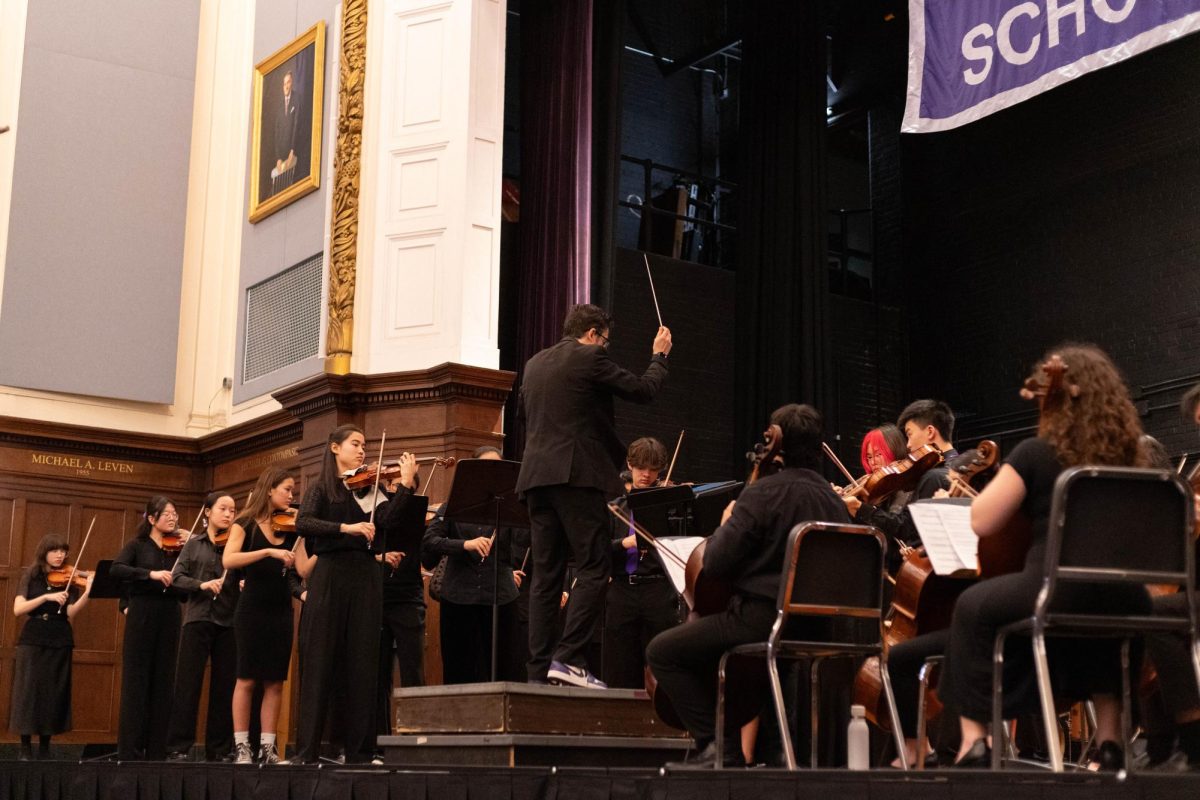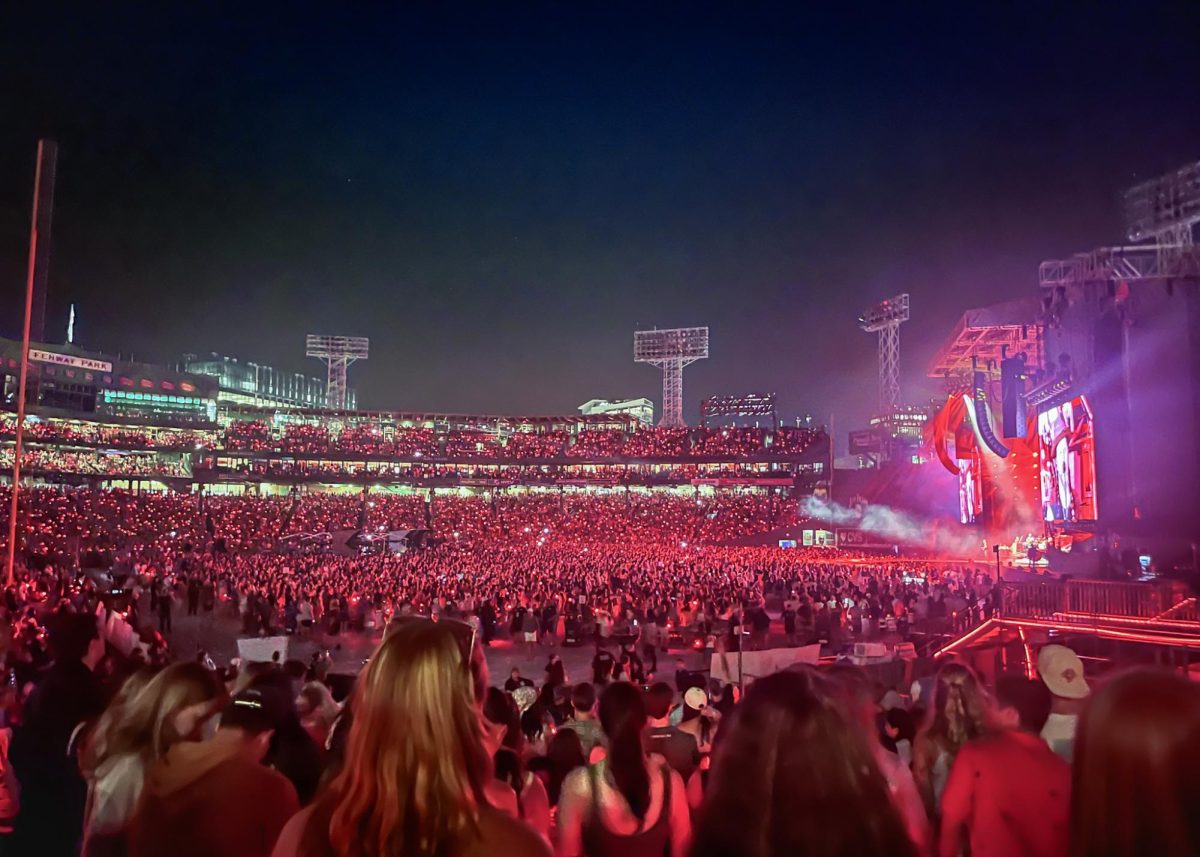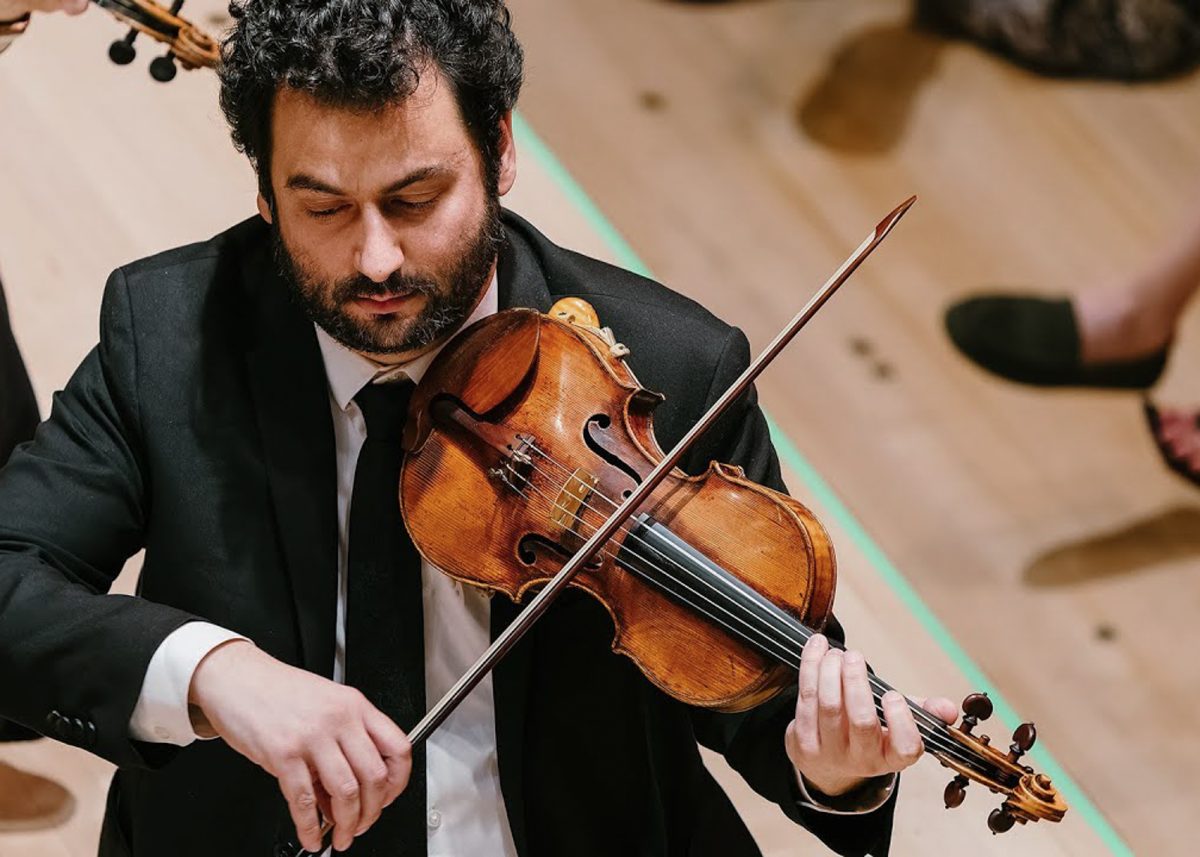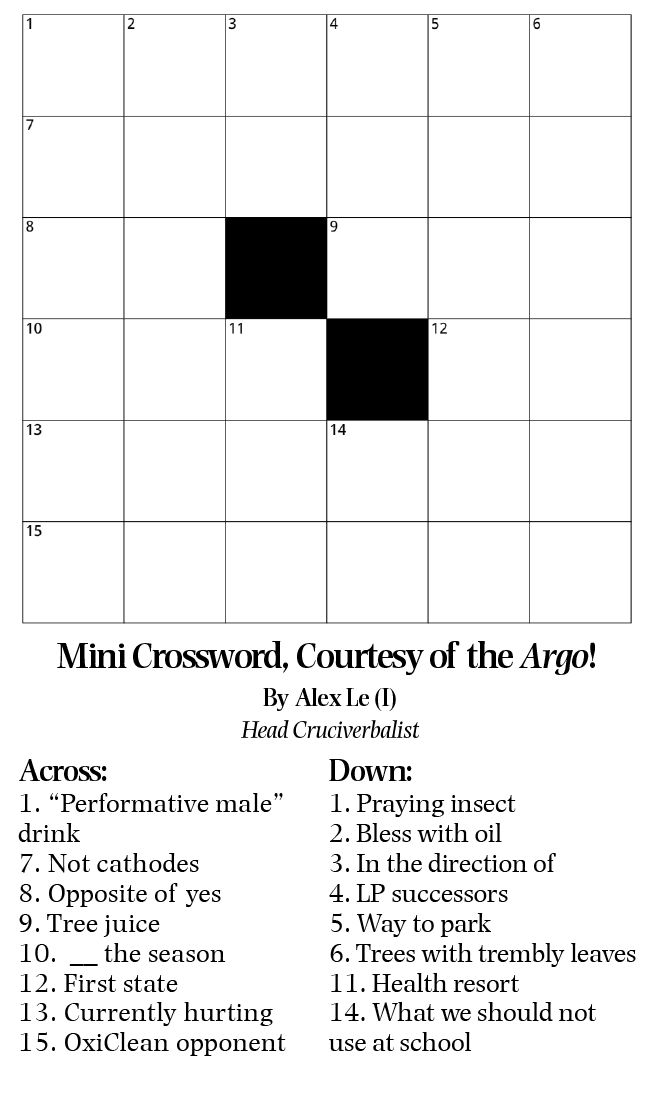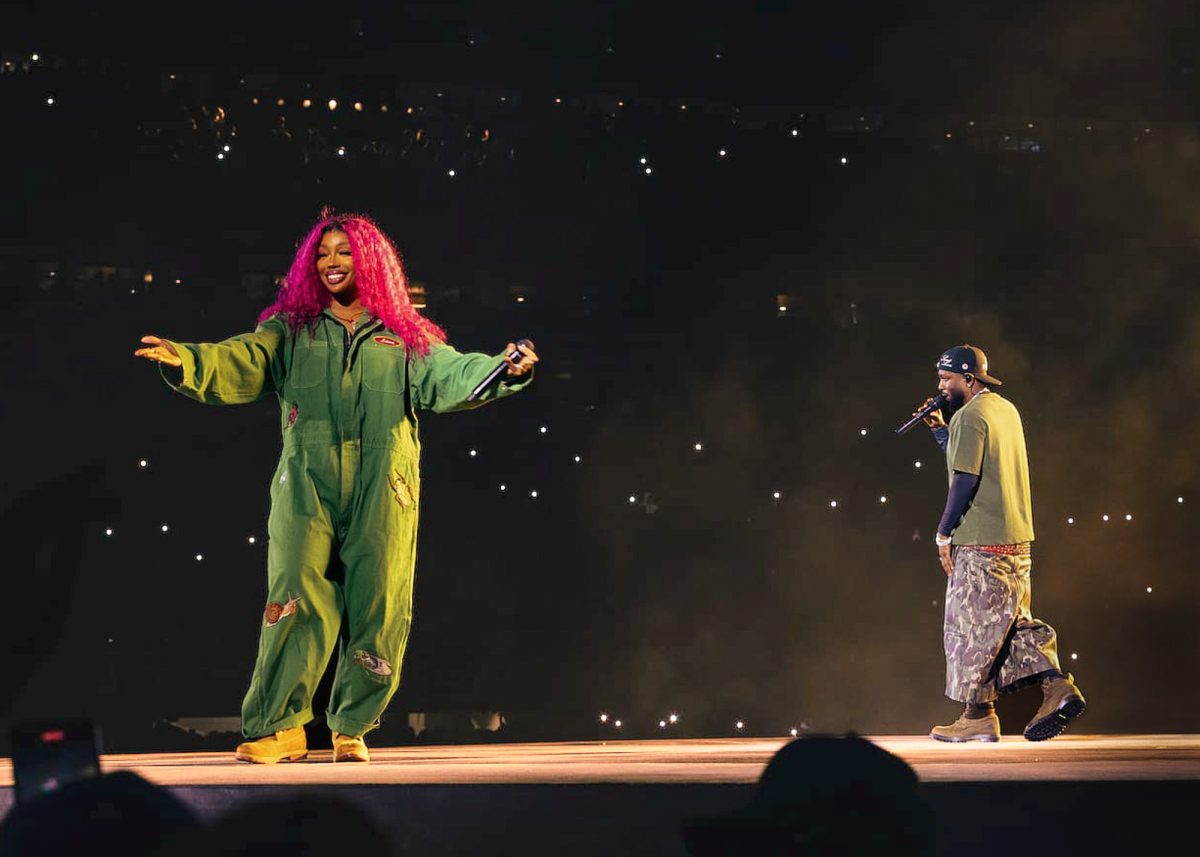In the evening hours of December 11, 12 and 13, the halls of the Boston Latin School auditorium became a symphony hall, a jazz club and a Broadway stage as students flooded the stage for the annual holiday concerts! Hundreds of students performed over three evenings in choirs, bands and orchestras. The School was abuzz with smiling, proud families, friends and alumni. It was especially exciting to watch the soloists, who bravely shared their musical talents in the spotlight. There was Fran Martin (V), whose bright and soulful tone made “Winter Wonderland” come alive; Maya Bekheirnia (V), whose piano accompaniment for Class V Choir’s “Possibility” created a hopeful, forward-moving mood perfect for the song’s message: Sasha Deras Melendez (V), who would make Laufey proud with the smooth, Bossa Nova melancholy she brought to “From The Start” and Iris Tian (I), who dazzled audiences with her honey-sweet, gravity-defying violin solo during “Russian Easter Overture.” Behind these polished performances lay hours of often overlooked rehearsals, practice and planning. The Argo sat down with BLS Visual and Performing Arts faculty Ms. Margaret McKenna (MCK) and Ms. Koriana Lewis Bradford (KLB) to hear about this preparation:
Q: What is one piece you are especially excited about for this concert? Any history you want audiences to know?
KLB: “In Gospel Choir, we are singing the piece “Hallelujah: A Soulful Celebration,” which the late, great Quincy Jones helped produce and arrange. Jones was a musical prodigy who played trumpet and grew up to compose, arrange and produce timeless classics. Most students would recognize his work on Michael Jackson’s Thriller album. This joyous, soulful rendition of G.F. Handel’s “Hallelujah Chorus” from the “Messiah” is genius. It’s our honor to pay homage to Quincy Jones in this way. The arrangement is sure to have the audience rockin’ and clappin’ — on the twos and fours, of course!”
MCK: “I’m really digging […] “Transcendent Light,” a multi-movement piece by Kenley Kristofferson, a Canadian composer out of Ottawa. He wrote this piece in memory of Ken Epp, a big band director in the Ottawa scene. We’re playing it in reverse. Normally, the first movement is “‘Tis Joy,” and you have this composer who they described as a larger-than-life person, just exuding joy every time you saw him. Then you have a slower movement in the middle, which is normal compositionally. But to end a multi-movement piece on a slow movement, […] called “In Stillness,” […] is very abnormal and […] the composer intentionally did this because it’s the moment of acceptance in Epp’s life. He had accepted what his fate was — he was dying of cancer, and that everything would be kind of still.”
Q: Can you shout out a section that has been crushing it this semester?
MCK: “The trombones […] are conveying a lot of subtle changes that make a difference in each of the pieces. In “Incantation and Dance,” they have to get the groove and then on a dime have to turn around and go (she hums the melody) […] and they’re doing that very successfully. […] They’re a really good example of when you have six people locked in. There are other parts of the band that are also doing that!”
KLB: “Class V Sopranos have grown by leaps and bounds in their ability to blend. They are sounding like one voice and it’s lovely. Class V Alto Ones have been holding down the most insanely difficult harmonies that are not easy to sing when hearing the melody in your ears. Class V Alto Twos have stepped up to help sing alongside our small, faithful crew of tenors. They have a deep, wide range and are helping bring balance to the sound. The tenors work hard to maintain their part and sing out confidently despite being outnumbered. And the basses have been overcoming their shyness and challenging themselves to sing out louder […] [so] everyone is giving their best effort!”
Q: Let’s get nerdy. Can you describe a favorite moment in one of these pieces?
KLB: “The swelling inverted singing of “amens” in “Total Praise” grips my soul every time in Gospel Choir. […] In [Class VI Choir], I love “October Twilight.” Its beautiful, unforgettable melody pulls at your heartstrings, and its message reminds us to be grateful for all that we have, while being mindful to help those who are suffering and in need.”
MCK: “The crescendo into measure 24 (of “In Stillness, Transcendent Light”). At the beginning, everything is super piano, there’s no real growth musically. Then, you have these trading eighth notes […] (she sings). […] It will keep building, building, building […] and then the flutes, oboes and clarinets have these revelatory soaring moments. They have finally done what you expect them to do. He delays this until almost the end of the song. It’s gorgeous. It’s beautiful.”
The Argo: “It’s like that idea of chiaroscuro: the light and then the dark.”
MCK: “That’s exactly what it is. When there’s something as tragic as being ill you can still have some bright moments.”
Q: What is one area you’ve focused on with your students this semester?
MCK: “Digging a little deeper into musicality: […] how to convey an emotion based on tone quality, blend and balance, playing in tune, articulation [and] dynamics. Music needs to be moving, either coming from or going to someplace. It is traveling on an axis. There are little glimmers of it every time, [and] when we’re all rowing together, I get those pseudo-goosebumps. My hairs stand on end.”
Q: What is a challenge you have faced this semester?
KLB: “I’m in a great place mentally this year. I’ve had to overcome tremendous struggles over these last few years; the deaths of my dad, brother and mom, severe personal illness and hospitalizations, all while raising two kids and completing another degree. This year, I feel some of that weight has been released off of me. It was my students who contributed to my healing. [They] bring me so much joy and laughter every day. […] [They] are maturing and beginning to take ownership of their own learning and musicianship. I’m blessed to be able to do what I love with such brilliant, young people!”
The Argo also spoke with student soloists about their experiences soloing in this concert and their relationship to music as a whole:
Q: Talk to us about your solo, and have there been any challenges to it?
IT: “I would describe my solo as very free. […] There’s a harmony of just cellos and violas holding the same note, so I can really […] take my time. In music, we call it rubato. Instead of a conductor just beat-ing you, he actually just lets me play for that part.”
SDM: “One of the [challenges] is passing the mic, because there’s two other soloists in my song, and we have to pass the mic, and we’re trying to get that to be cleaner.”
MB: “I had a very limited timeline, and the song is very high tempo. […] I did manage to figure it out, but I really had to prepare.”
FM: “Some challenges with this particular solo are that it’s higher in my range. Also, when first singing it in front of my choir, I was very nervous, so becoming confident […] has also been a bit of a challenge. But after some practice, I think I’ve really gotten the hang of it.”
Q: What do you love about your ensemble or music in general?
FM: “So many of my friends are in this ensemble, and so many of the people in this ensemble are becoming my friends. It’s nice to have a break from the usual academics of the day […] and come together over our love of singing. It’s also such a joy to learn from someone with such a passion for the arts and conducting. Music is a universal language, and music is healing […] we can all appreciate music and the musical talents of others, regardless of our differences.”
SDM: “I just like rhythms, because […] [they] can get you in certain types of moods. […] It can […] brighten your day, and make everything more fun.”
IT: “While I’m playing, there’s no other thought in the world. It’s just me and my violin. It’s very freeing, especially because there’s a lot of stress; […] music is one time to just focus on yourself, your sound, the sound of the orchestra and the people around you.”
Q: Do you have any advice for aspiring musicians? How do you handle nerves?
SDM: “Forget about what other people think and just do it. At some point in your life, you’re not going to have time to sing: […] do your passion when you’re able to.”
MB: “Try to not give up, honestly. I know that playing an instrument can be really hard, [but] as long as you have the passion, as long as you practice […] then you can really do anything you want.”
FM: “Start small. Maybe join a local choir at school or in [your] community with [your] friends where [you] feel comfortable, and go from there. Just because the world tells you or you tell yourself that you “can’t sing” or “aren’t the best singer,” doesn’t mean you don’t have something to bring to the table.”
Students interested in getting involved in the music programs at BLS should visit the music wing after school or email Ms. McKenna at [email protected].



